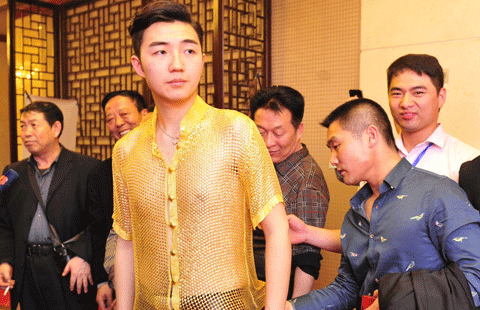Framework for final deal reached at Iran nuclear talks
Updated: 2015-04-03 03:34
(Agencies)
|
||||||||
 |
|
US President Barack Obama speaks about the framework agreement on Iran's nuclear program announced by negotiators in Switzerland during a statement in the Rose Garden of the White House in Washington April 2, 2015. [Photo/Agencies] |
Iran and world powers reached a framework agreement on Thursday on curbing Iran's nuclear program for at least a decade after eight days of marathon talks in Switzerland.
The tentative agreement clears the way for talks on a future comprehensive settlement that should allay Western fears that Iran was seeking to build an atomic bomb and in return lift economic sanctions on the Islamic Republic.
US President Barack Obama said in a statement the outcome was a good deal, comparing it to nuclear arms control deals struck by his predecessors with the Soviet Union that "made our world safer" during the Cold War.
"Today, the United States, together with our allies and partners, has reached an historic understanding with Iran, which if fully implemented, will prevent it from obtaining a nuclear weapon," he declared.
Under the outline deal, Iran would shut down more than two-thirds of its centrifuges producing uranium that could be used to build a bomb, and dismantle a reactor that could produce plutonium and accept intrusive verification.
"Today we have taken a decisive step, we have reached parameters," EU foreign policy chief Federica Mogherini told a news conference. "The political determination, the good will of all parties made it possible.
"This is a crucial decision laying the agreed basis for the final text of joint comprehensive plan of action. We can now start drafting the text and annexes," said Mogherini, who has s acted as a coordinator for the six powers - Britain, China, France, Germany, Russia and the United States.
IRANIAN CAUTION
The framework, fiercely opposed by US ally Israel, includes limits on Iran's enrichment of uranium for 10 years.
Iran's Foreign Minister Javad Zarif cautioned however: "We're still some time away from reaching where we want to be."
A Western official said the sides had agreed that the comprehensive settlement would require Iran to dilute or ship abroad most of its stocks of enriched uranium, and leave just 6,000 out of the 19,000 centrifuges it operates for enrichment.
The deal wrapped up eight days of talks, extended after a deadline of midnight on Tuesday, aiming to achieve a political accord that could serve as the basis of a final deal by June 30.
Western countries say enriched uranium can be used to make a weapon, which they aim to prevent. Iran says it wants it only for a peaceful nuclear energy program.
The talks were the biggest opportunity for rapprochement between Washington and Tehran since they became enemies after Iran's 1979 revolution, but any deal faces scepticism from conservatives in both countries. US allies in the Middle East are also skeptical, especially Israel and Saudi Arabia.
Zarif said that other realms of Iran and US relations had nothing to do with the agreement.
"This was an attempt to resolve the nuclear issue...We have serious differences with the United States," he said.
"We have built mutual distrust in the past... So what I hope is that through courageous implementation of this some of that trust could be remedied. But that is for us all to wait and see."

 2015 New York International Automobile Show kicks off
2015 New York International Automobile Show kicks off
 Ancient 'Xiangshi' kicks off in Wuzhen
Ancient 'Xiangshi' kicks off in Wuzhen
 Golden moments at jewelry show
Golden moments at jewelry show
 Luoyang, the ancient capital of thirteen dynasties
Luoyang, the ancient capital of thirteen dynasties
 Across America over the week (from March 27 to April 2)
Across America over the week (from March 27 to April 2)
 Off the beaten path: China's top 'surf' breaks
Off the beaten path: China's top 'surf' breaks
 Where eagles still soar
Where eagles still soar
 Top 5 cooperation priorities in the Belt and Road Initiative
Top 5 cooperation priorities in the Belt and Road Initiative
Most Viewed
Editor's Picks

|

|

|

|

|

|
Today's Top News
Xi plants roots of
green awareness
Li backs firms' global vision
China to standardize energy conservation by 2020
More Chinese, US pilots killed in anti-Japanese invasion war identified
China checkmates US on Asia bank
Policy helps China to urbanize
Curbing 'brushing' difficult: report
Conflict not inevitable: Joseph Nye
US Weekly

|

|







